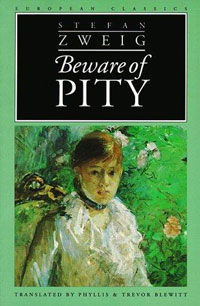 Stefan Zweig, author of the novel, "Beware of Pity," was one of the most famous writers in the world in the 1920s and 30s. |
Professor Mark H. Gelber, one of the world’s most eminent authorities on the works of the early 20th century Jewish-Austrian author Stefan Zweig, will deliver the first biannual Stefan Zweig Lecture at SUNY Fredonia focusing on Zweig’s contribution to world literature.
The lecture will be held on Thursday, March 3 at 4 p.m. in the Japanese Garden section of Reed Library with a reception following immediately after. It is free and open to the public.
SUNY Fredonia is the home of the internationally-reputed Stefan Zweig Collection, which includes the valuable Stefan Zweig Manuscript Correspondence.
Dr. Gelber, a New York City native, received his Ph.D. from Yale before currently serving as the professor of comparative literature and Director of the Center for German and Austrian Studies at Ben-Gurion University in Israel. He’s also been a visiting professor at the University of Pennsylvania, University of Graz (Austria), University of Maribor (Slovenia) and Yale University.
He has published numerous articles and books on German and Austrian Jewish writers, with a focus on issues concerning acculturation, Jewish identity, anti-Semitism, and Cultural Zionism. Dr. Gelber has extensive publications on the work of Stefan Zweig and has done research on the archival materials in SUNY Fredonia’s Stefan Zweig Collection, which happens to be the largest of its kind in North America.
The Stefan Zweig collection in Reed Library contains published novels, short stories, plays, poems, essays, correspondence and other writings by Zweig. This renowned Austrian was known in the literary community as a humanitarian thinker whose prolific literary career and extraordinary life offer unique insight into the artistic and political turbulence of the first half of the 20th century.
Born in 1881, Zweig was forced into exile during Hitler’s rise to power in Germany. Zweig, whose books were burned by the Nazis, fled Vienna in 1934, moving first to England, then to the U.S. and, in 1941, Brazil. Shortly after moving to Brazil, and distraught by another war that was ravaging his European homeland and its culture, Zweig took his own life through a suicide pact with his second wife, Lotte, in 1942.
For more information contact Assistant English Professor, Birger Vanwesenbeeck at vanweseb@fredonia.edu or 716-673-3847. The Library's holdings can be accessed by using the online catalog via the Reed Library homepage on the Internet. (https://www.fredonia.edu/library/)



